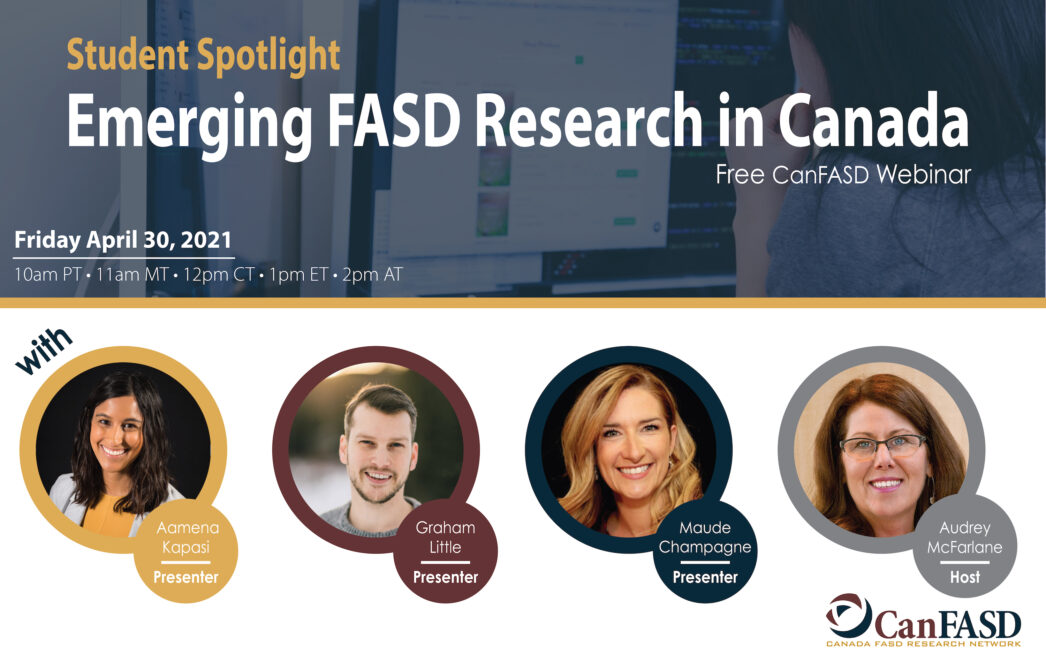Register for our newest webinar on April 30th at 1:00 pm eastern time. Our Student Spotlight: Emerging FASD Research in Canada will feature presentations from Drs Graham Little, Maude Champagne, and Aamena Kapasi. These graduate students and early career researchers are doing innovative new work to move the field of FASD forward. From the stresses of COVID-19 on individuals with FASD and their families to ground-breaking brain imaging findings to hopeful interventions for motivation and self-regulation, this webinar has something for everyone from all backgrounds.
Using brain signatures to identify FASD
Dr. Graham Little
Magnetic resonance imaging (MRI) studies have been very useful in understanding the relationship between prenatal alcohol exposure and alterations in brain structure. However, imaging is rarely used during FASD clinical assessment because these brain alterations remain “invisible” to standard clinical imaging. In this work I developed unique softwarethat extracts a “brain signature” of FASD. This tool could be useful for the clinical diagnosis of FASD, as well as for understanding the cognitive differences observed in individuals with FASD.
Did the COVID-19 pandemic increase challenges for families?
Dr. Maude Champagne
Since the beginning of the pandemic there has been a growing concern about increased challenges experienced by families raising children and youth with FASD. This study explored the needs of these families. The most significant finding was an increased incidence of challenging behaviours, including aggression towards family members. Previous mental health issues and externalizing behaviours of children were reported as being exacerbated due to the disruption in services, loss of routines and structures. Placement instability, mental health issues in the child, siblings and parents were all amplified. This study underscores the need for increased mental health support for individuals with FASD and their families, including safe and accessible respite options and interventions to respond to challenging behaviours both during and post-pandemic.
Mindset Theory as a Self-Regulation Intervention
Dr. Aamena Kapasi
Mindset theory is a theory of achievement motivation that has been found to have an important impact on education and intervention outcomes. This presentation will focus on mindset theory and its implications for adolescents with FASD in the context of a self-regulation intervention. This mixed methods study used both questionnaires and interviews to increase understanding of mindsets in adolescents with FASD. I will review and discuss results of mindsets in adolescents with FASD, intervention impacts on mindset, and the factors that influence the development of their mindset. I will also highlight recommendations for caregivers and professionals who work with adolescents with FASD.
Meet the panelists!
-

Maude Champagne is a Neurosciences Phd Student at Queen’s University under the supervision of Dr. James Reynolds and a trainee with Kids Brain Health Network. She is also a registered Social Worker, psychotherapist at Ottawa Center for Attachment and Trauma Therapy (OCATT). Her research interests are around FASD, neurodevelopmental disorders, trauma and program evaluation. -

Aamena Kapasi is a post-doctoral fellow at the University of Alberta and is working on the Substance Use and Addictions in FASD Populations study for her post doctoral research in partnership with CanFASD. Aamena completed her Masters of Counselling Psychology at the University of Western Ontario, and her Ph.D in School and Clinical Child Psychology at the University of Alberta. She has been conducting research in the area of FASD since 2013 and her research is focused on supports and interventions for individuals with FASD. She has a passion for both research and clinical work and children, youth, and families. -

Dr. Graham Little is a postdoctoral fellow in the department of Biomedical Engineering at the University of Alberta, Edmonton, Canada. In his research, he uses magnetic resonance imaging (MRI) combined with advanced computer analysis techniques to further our understanding of brain development and FASD.

